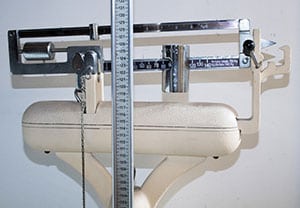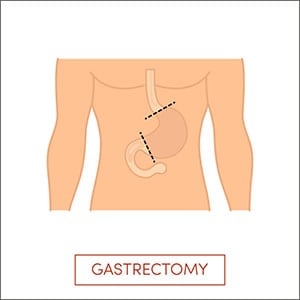Gastric Sleeve Surgery
IS GASTRIC SLEEVE SURGERY RIGHT FOR YOU?
Is your BMI over 30? Are you ready to improve your quality of life? Clinical studies have proven significant weight loss with Gastric Sleeve Surgery.
In clinical studies of severely obese patients, the gastric sleeve surgery has been shown to be a highly effective surgical method for weight loss.
Key Benefits*:
- Improves co-morbid conditions such as Type 2 diabetes and hypertension
- Reduces the use of medication to treat certain conditions
- 46 to 83 percent excess weight loss just one year after surgery
*Results may vary, and outcomes are not guaranteed
CONTACT US TODAY
 Gastric sleeve surgery, sometimes referred to as vertical sleeve gastrectomy, is a new form of weight loss surgery that is gaining in popularity. The technique is minimally invasive and does not require ongoing follow-up visits or foreign objects in the body. The success of the procedure depends in large part on how well you follow your doctor’s instructions regarding aftercare, diet, and exercise. The following looks at what you can expect immediately after your sleeve surgery and in the long-term.
Gastric sleeve surgery, sometimes referred to as vertical sleeve gastrectomy, is a new form of weight loss surgery that is gaining in popularity. The technique is minimally invasive and does not require ongoing follow-up visits or foreign objects in the body. The success of the procedure depends in large part on how well you follow your doctor’s instructions regarding aftercare, diet, and exercise. The following looks at what you can expect immediately after your sleeve surgery and in the long-term.
To learn more about this procedure and to determine if it could be a good fit for you, contact our office today and schedule a free consultation.
Immediately After Surgery
The sleeve procedure itself typically takes one to two hours, and you should expect to be hospitalized for a couple of days following the surgery. It is normal to experience some swelling and abdominal soreness; however, you will be given pain medication to help with the discomfort. You will be given aliquid-only diet while in the hospital, and you will need to remain on this diet for about two weeks. It is important that you follow your doctor’s instructions regarding diet to the letter to prevent potential complications.
Two Months Post Surgery
During the first couple of months following your surgery, you will gradually transition from liquids to pureed foods and then to solids foods. Your doctor will tell you when it is appropriate to transition to each stage of your diet. During this time, you will also need to teach yourself a new way of eating that you will need to continue throughout your life to ensure success:

- You should avoid drinking beverages with your meal. It is best to drink any beverages about 30 to 60 minutes before you plan to eat. You should also stay away from carbonated drinks that may cause discomfort.
- You should eat small quantities of food as directed by your doctor. Overeating can stretch the stomach out of shape and jeopardize your weight loss efforts.
- You should eat slowly and ensure that you chew each bite thoroughly.
- Reduce carbohydrates, such as bread and pasta, whenever possible.
- Eat a diet high in lean protein, fruits, and vegetables.
During the first few months after surgery, you may find that you are a little more emotional than usual. This is perfectly normal for a couple of reasons:

- You are undergoing a significant physical transformation and are getting used to major lifestyle changes.
- The rapid weight loss can trigger changes in hormone levels. This can leave you feeling a little tired and moody.
Not everyone will experience mood changes. If you do, you can rest assured that they will go away with time. Keep in mind that you can talk with your doctor if you are concerned.
Long-Term Benefits
The majority of patients undergoing gastric sleeve surgery can expect to lose approximately 60 percent of their excess weight; however, the exact amount of weight you lose is dependent on how well you incorporate dietary changes and exercise into your lifestyle. It is also common for patients to hit a weight loss plateau several months following surgery. The body’s natural response to the significant decrease in food is to slow down the metabolism. Most patients are able to overcome the plateau by increasing their activity level. You may even be able to speed up your metabolism by adding a small between meal snack.
The results that you experience will depend on many factors, including your pre-surgery weight and overall health. The best way to understand the results that you are likely to experience is to talk with your doctor about your expectations. The results vary for each patient.
Maintaining Your Gastric Sleeve
 Unlike the lap band, a gastric sleeve does not require that you see your doctor for regular fills. The only ongoing maintenance required is a commitment to diet and exercise changes to ensure continued weight loss. You should set a goal of exercising for 30 minutes for a minimum of three days a week. You will enjoy even better results if you can push that up to five to seven days a week. The goal is to elevate the heart rate in order to burn more calories. If you were sedentary before your surgery, you should start slowly and gradually increase the length and intensity of your workout. Daily walks are often a good place to start, especially immediately after surgery.
Unlike the lap band, a gastric sleeve does not require that you see your doctor for regular fills. The only ongoing maintenance required is a commitment to diet and exercise changes to ensure continued weight loss. You should set a goal of exercising for 30 minutes for a minimum of three days a week. You will enjoy even better results if you can push that up to five to seven days a week. The goal is to elevate the heart rate in order to burn more calories. If you were sedentary before your surgery, you should start slowly and gradually increase the length and intensity of your workout. Daily walks are often a good place to start, especially immediately after surgery.
As a general rule, you should avoid any type of weight training for at least six months following your surgery. You doctor will provide you with specific activity limitations and recommendations for each stage of your recovery.
It is also important not to fall back into any bad dietary habits. Eating high-calorie, high-fat, or high-sugar foods can derail your weight loss goals even though you may only eat them in small amounts. Your doctor, dietician, and patient support groups can provide you with information on meal plans, grocery shopping strategies, and how to cope with big family holiday meals that can be tempting.
Never Give Up
 Surgical weight loss is not a quick fix. It is a tool designed to help you achieve a healthier lifestyle. Everyone experiences the occasional setback when it comes to diet and exercise. The key is to identify those situations, emotions, or activities that may tempt you to fall off your plan so that you can avoid them or have a coping mechanism in place. You should also look at each day and each meal as an opportunity to make healthier choices. What is important is that you don’t let one bad day or meal turn into an ongoing cycle that can lead to weight gain.
Surgical weight loss is not a quick fix. It is a tool designed to help you achieve a healthier lifestyle. Everyone experiences the occasional setback when it comes to diet and exercise. The key is to identify those situations, emotions, or activities that may tempt you to fall off your plan so that you can avoid them or have a coping mechanism in place. You should also look at each day and each meal as an opportunity to make healthier choices. What is important is that you don’t let one bad day or meal turn into an ongoing cycle that can lead to weight gain.
To learn more about the gastric sleeve surgery, as well as other types of surgical weight loss, contact our office today to schedule a free consultation with Dr. Naim. We can help you understand what the procedure entails and how it might be able to fit in to your life and goals.
Schedule Your Free Consultation Today!
Contact Info
3420 Bristol St #700, Costa Mesa, CA 92626, USA
Orange Location
1310 W Stewart Dr. Suite 310, Orange, CA 92868, USA
*DISCLAIMER
In compliance with 16 CFR 255 and Federal Trade Commission Guidelines on the use of endorsements and testimonials in the marketing and advertising of websites:
The testimonials, statements, and opinions presented on our website are only applicable to the individuals depicted, and may not be representative of the experience of others. The testimonials are voluntary provided and are not paid, nor were they provided with free products, services, or any benefits in exchange for said statements. The testimonials are not indicative of future results or success of any other individuals. South Coast Specialty Surgery Center cannot and does not guarantee the medical outcome or the results of individuals utilizing the services provided by us or the providers in our network, or from any of the websites we link, or refer to. The testimonials and endorsements found on the site for the benefit of the site or individual services or procedures are, to the best of our knowledge, the true statements and beliefs of the individuals providing them. In short, surgery involves risk, results may vary, and outcomes are not guaranteed.
Some pages of this website may feature a depiction of a model showing emphasis of the torso. Product names may be mentioned in testimonials or elsewhere, and are trademarks or registered trademarks of their respective holders. Please refer to our Terms and Risks of Surgery pages for more information. Gastric Sleeve Surgery Centers performs Gastric Sleeve Surgery in Orange County, San Diego, Los Angeles, Riverside County and other location in Southern
California.
